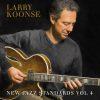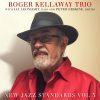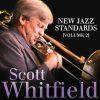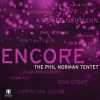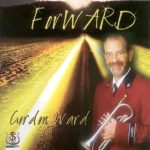New Jazz Standards Vol 6 • The Music of Carl Saunders – Ben Powell, Christian Jacob, Kevin Axt, Peter Erskine
Featuring world-class violinist, Ben Powell, with Christian Jacob, Peter Erskine and Kevin Axt, the sixth volume in the New Jazz Standards series accomplishes several ambitious goals. Like the previous releases, it’s a striking affirmation that Carl Saunders possesses a deep, varied and exceptionally rich catalog of tunes ripe for interpretation by some of jazz’s most eloquent improvisers.
Vol. 6 also serves to reintroduce violinist Ben Powell, a player whose budding reputation as a world-class jazz artist has been eclipsed in recent years by his status as a first-call studio musician and muse for heavyweight Hollywood composers such as Alexandre Desplat, Danny Elfman, Alan Silvestri and Hans Zimmer (he did all of the violin work on the Top Gun: Maverick soundtrack). While the jazz scene could certainly use a virtuosic violinist with his expansive toolkit, Powell isn’t looking to get back into the jazz fray. This project is more a neon-lit marquee on a road not taken than a preview of Powell’s coming attractions. VOLUME 6 is the combination of one of the world’s greatest rhythm sections, a selection of Hollywood’s most formidable musical arrangers and two years of recording…
REVIEW:
I’m always excited to see another installment in the ongoing New Standards series, which has featured a variety of artists performing tunes by the gifted composer Carl Saunders. Referring to these as “new standards” may sound a bit bold, but I have yet to hear a Saunders chart that I don’t believe could easily meet that… er… standard. The latest release in the series features violinist Ben Powell leading a quintet that includes the legendary drummer Peter Erskine and pianist Christian Jacob. Powell’s arrangements find him often multi-tracking himself on violins and violas, sometimes creating unusual effects. For example, on “Solicitude” he writes parallel harmonies for the strings that give a bit of a Jon Hassell vibe to the arrangement, while on “I Can Dig It” he plays the head on both violin and viola in octaves and then in more conventional voice-led harmony. His stylistic range is impressive — his solo on “Latin Tendencies” is delightfully light and frothy; the violin-piano duet setting of “Shared Secret” is tender and beautiful. The whole album is an excellent addition to the series.
-CD HOTLIST
…from the notes of Andrew Gilbert:
The sixth volume in the singular New Jazz Standards series accomplishes several ambitious goals at once. Like the previous installments, it’s a striking affirmation that trumpeter Carl Saunders possesses a deep, varied and exceptionally rich catalog of tunes ripe for interpretation by some of jazz’s most eloquent improvisers. Vol. 6 also serves to reintroduce violinist Ben Powell, a player whose budding reputation as a world-class jazz artist has been eclipsed in recent years by his status as a first-call studio musician and muse for heavyweight Hollywood composers such as Alexandre Desplat, Danny Elfman, Alan Silvestri and Hans Zimmer (he did all of the violin work on the Top Gun: Maverick soundtrack). While the jazz scene could certainly use a virtuosic violinist with his expansive toolkit, Powell isn’t looking to get back into the jazz fray. This project is more a neon-lit marquee on a road not taken than a preview of Powell’s coming attractions.
Saunders however is still in the early stages of excavating fruitful decades of composing. Summit Records launched the ongoing New Jazz Standards project in 2014 with an acclaimed album showcasing the nonpareil jazz flute pioneer Sam Most. In what turned out to be his final recording, the 82-year-old Most delivered a bravura performance gracefully navigating the intricate harmonic settings that Saunders knew his buddy would love. Each new New Jazz Standards edition has followed a similar template, with a prodigiously gifted artist choosing about a dozen pieces from the Saunders Songbook. Trombone great Scott Whitfield, piano legend Roger Kellaway, guitarist’s guitarist Larry Koonse, and sparkling pianist Christian Jacob have all plunged into Saunders’ music. Taken together, the series makes an incontrovertible case for his seemingly indefatigable gift for musical invention.
“My approach to writing music and of course we’re talking about jazz music is kind of upside down in a way. I hear the melody in the chord progressions and the chord progressions in the melody. Once the actual melody is set it stabilizes and supports the chord changes not the other way around,” Saunders said. “And I got these great artistic musicians to come in and bring those sometimes complicated chord progressions to life with their creatively imaginative accompanying and improvising.” “I give them my book “New Jazz Standards” of over 300 tunes and they pick what tunes they want to do. It has been very humbling to have these great musicians interpret and play my music on all the volumes of the New Jazz Standards series that Summit Records and I have worked to create.”
For jazz fans who haven’t been paying close attention, Saunders’ emergence as a prolific composer might come as a surprise. After joining Stan Kenton fresh out of high school (initially on mellophonium) at 18 years old, he spent a year or two touring with bandleader Bobby Sherwood, his maternal uncle playing drums. Settling in Las Vegas, Saunders spent two decades as the city’s leading lead trumpeter, backing and touring with stars such as Frank Sinatra, Ella Fitzgerald, Tony Bennett, and Sammy Davis Jr. Robert Goulet and Paul Anka. Relocating to Los Angeles in 1984, he quickly became an essential component of the Southland’s most fertile jazz orchestras, playing lead trumpet with Bill Holman, Bob Florence, Johnny Mandel the Terry Gibbs dream band and Gerald Wilson. He also started leading his own bands, releasing his first album under his own name with 1996’s Out of the Blue. His CD “ Elcleticism” is outstanding with a full string orchestra. Saunders says, “I always try to do a blend of originals and standards on my recordings.”
While Powell and Saunders first met through a mutual friend on the golf course, the violinist quickly realized that he was already well acquainted with the trumpeter’s work. Studying jazz composition at Berklee College of Music, Powell was “listening to a bunch of Bob Florence records and one in particular featured Carl,” he said. “I went home to find out I’d been listening to him for years.” He gave Saunders a copy of his 2012 Stephane Grappelli tribute New Street featuring vibraphonist Gary Burton and guitarist Julian Lage, and they started hanging out to play together. “We’d read out of his book every time I’d go over,” Powell said. “He’d play the piano and he’d flip through the book and pick out tunes that he thought would fit. I’d attempt to blow over them, though in many cases his harmonic writing is pretty complex.”
The friendship evolved into a jazz mentorship. Saunders was drawn to Powell’s formidable technique and light, singing tone. Powell refined his sense of time while playing with Saunders, who’s also a pretty good drummer. As much as he loved working through the material, he dug that hang, “Hearing Carl’s stories of his decades of touring and playing with these names I had studied, playing dance halls and being on the bus with a big band, what Vegas was like when live music was in all the hotels.”
In recruiting Powell to record Vol. 6, Saunders brought in a superlative combo featuring drum maestro Peter Erskine, Christian Jacob and bassist Kevin Axt. It was a felicitous combination, as Powell played on the score that Jacob helped compose for Clint Eastwood’s 2016 film Sully “and had worked several other times together,” Powell said. “He’s my favorite piano player.” Like on the previous New Jazz Standards releases Saunders commissioned some of the music’s finest arrangers. Powell contributed two charts himself, taking full advantage of being able to record himself at his home studio. He created three violin tracks for the briskly swinging “Main Squeeze,” a joyous piece that features a particularly elegant solo by Jacob. On “Latin Tendencies” Powell filled out the dramatic melody with some subtle background voicings that thicken the texture and heighten the tension until a single line breaks free and soars over the mesh.
Jacob also contributes two arrangements. The surpassingly tender “In Simple Terms” opens like a folky lullaby but the deliberately paced setting gradually grows in complexity, with Powell doubling the enchanting melody. Summoning a very different vibe, Jacob and Jackson Stock highlight the blithe humor in “I Can Dig It,” which could serve as a cinematic theme for a dandy detective. Roger Kellaway, a jazz master with a long history of writing for strings, delivers one of the album’s highlights with his evocative setting for Saunders’ “African Dreams.”
Powell puts in overtime on Brent Fischer’s arrangement of “Blues for Dexter Gordon,” a piece that calls for laying more than a dozen string parts. The swaggering tune is a straight ahead swinging blues that could fit comfortably in the Nat Adderley songbook or in a set by tune’s Long Tall namesake. And Scott Whitfield delivers an unvarnished take on “Good Vibes Blues,” a tune that serves as a buoyant reminder that in the right hands a blues can fend off a case of the blues. Powell brings the requisite spirit with his lithe, even tone, something he worked on intensely while recording the album.
“Carl wanted me to explore playing with little or no vibrato, which as a classical violinist is a foreign concept,” Powell said. “We use it for volume and expression. He was trying to get me to think more as a horn player with a modern jazz approach. He loves it to be pure without the vibrato, so I started playing around with this sound. I’d record a part and go away for a few weeks, come back and rerecord it.”
The arrangers deserve a good deal of credit for the album’s success, but one of the standout tracks is Powell’s duet with Jacob on “Sacred Secret.” Coming at the end of the album, it’s an extended melody that unfolds like a conversation between old friends. Patient and warmly affectionate, the tune feels both utterly self-contained and like part of a larger narrative, much like the album itself. With each new volume in the New Jazz Standards series the story of Saunders restlessly creative muse comes more clearly into view. Vol. 6 also offers strong evidence that Hollywood’s gain constitutes a steep loss for jazz.
-Andrew Gilbert is a Berkeley music writer who contributes regularly to the San Francisco Chronicle, JazzTimes, Berkeleyside, the East Bay Times, and many other publications.
REVIEW:
Playing violin and viola, Ben Powell gives tribute to the recently departed swinging trumpeter Carl Saunders with vibrant reads of his compositions. He’s teamed up with the stellar Christian Jacob/p, Kevin Axt/b and Peter Erskine/dr many times overdubbing the two strings to create a rich texture a la Stephane Grappelli, as on the warm Just A Samba” and “Latin Tendencies”.There’s an elegance to pieces such as “”Solicitude” and Powell’s strings bounce for joy on the upbeat “Richeting”. Erskine adds an exotic rumble to “African Dreams” and Axt brings in a nifty feel to “Main Squeeze”. A cheerful tribute.









